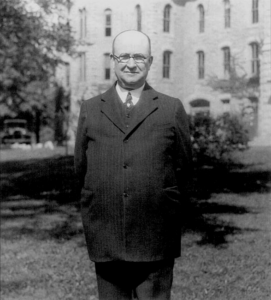
By Brad Doskocil
Bob Wilkin recently wrote an article suggesting that H. A. Ironside held to Free Grace Theology (FGT). I emailed him, suggesting that in some of his commentaries, Ironside made statements that are inconsistent with FGT. Bob asked me to send him some quotes; this article is the result. The following observations are based on Ironside’s commentaries on Acts and the Gospel of John.
Ironside’s Commentary on Acts
In his commentary on Acts, Ironside is strongly Free Grace in his comments on Acts 2:37: “Having accepted the message, we can be very sure of this—they were already born of God” (p. 42).
However, his comments on Acts 2:38 are inconsistent with FGT. He says that the believers of 2:37 needed “complete moral reformation” (p. 43).
His comments on Acts 3:14-16 and 3:18-19 also discuss turning from sins as being necessary for justification and everlasting life (pp. 55-57). Those comments are inconsistent with FGT.
Inconsistent with FGT, he understands Simon Magus in Acts 8 as “a baptized man, a religious professor, who had not been regenerated” (p. 107). His comment on Luke’s statement that “Simon himself believed” is that Simon gave “intellectual assent to the truths of God’s Word but…never faced [his] sins before God” (p. 106).
His comments on Acts 13:48 are excellent in part. Note that had he stopped after the first two sentences, his comments would have been consistent with FGT. It is the third sentence that introduces the problem: “Wherever you get a man determined to have eternal life, he can have it through believing on Jesus Christ. He does not have to stop and ask if he is elect or not. If he is willing to repent of his sin and come to Christ, he may have eternal life” (p. 178, emphasis added).
Commenting on the belief of those in Iconium (Acts 14:1), Ironside writes, “They so spake, that a great multitude…believed”1 (p. 179). Here, belief alone is sufficient for Ironside. While consistent with FGT, it is inconsistent with many of his other comments.
His comments on Acts 16:31 are consistent with FGT (unless by trust he implies something other than belief, which seems unlikely): “Their answer came back quick and clear: ‘Believe on the Lord Jesus Christ, and thou shalt be saved, and thy house.’ No beating about the bush. No going into labored explanation of Christian doctrine, or the nature of the church, or of sacraments. Clear and incisive was their message, ‘Believe on the Lord Jesus Christ (put your trust in the Lord Jesus Christ) and thou shalt be saved, and thy house’” (p. 205, emphasis his).
Ironside’s Commentary on John
His comments on believing in Him in John 3:16 are confusing. He writes, “‘Whosoever believeth?’ What is it to believe? It is to trust in Him; to confide in Him; to commit yourself and your affairs to Him” (p. 109). He then describes a woman reading a Greek NT and pondering the meaning of belief:
She went back in the chapter and then back into the last verse of chapter two, and she read, “Many believed in His name when they saw the miracles which He did. But Jesus did not commit Himself unto them, because He knew all men.” “Oh,” she said, “there it is!” “Jesus did not commit Himself unto them,” and she stopped and thought a moment, and light from heaven flashed into her soul. She saw that to believe in Jesus was to commit herself unto Jesus. Have you done that? (pp. 109-110).
If this is Ironside’s view of what it is to believe, then he falls into the camp of confusion. How much commitment is enough? How can anyone be sure? Has he redefined the meaning of belief? This is disappointing!
However, his comments on John 4:10-11 are excellent:
Note the answer of our blessed Lord: “If thou knewest the gift of God and who it is that saith to thee, Give Me to drink; thou wouldest have asked of Him, and He would have given thee living water.” What a wonderful revelation concerning the gift of God! Do you know the gift of God? Do you know that salvation is the gift of God? Do you know that eternal life is a gift? Do you know that God is not a merchantman seeking to bargain with people, but God is a Giver, offering everything freely? (p. 140).
Ironside drives home the point that everlasting life is a gift from God, and that we cannot earn it in any way. There is much here that is consistent with FGT.
His comments on John 6:47 are consistent with FGT as well (pp. 259-60).
However, his comments on John 11:25-27 are puzzling:
What is He telling her? Oh, He is telling her, “You don’t have to wait till the resurrection on the last day. I Myself am the Resurrection and the Life, and when I come into the scene death is at an end.” And He adds, “He that believeth in Me, though he were dead, yet shall he live”… Then he looks on to the time when those who have never died at all, but will be living on the earth when He returns, will be changed without dying and says, “Whosoever liveth and believeth in me shall never die.” What a wonderful revelation! And then He puts the question, “Believest thou this?”
I think she was a bit puzzled. She said, “Yea, Lord: I believe that thou art the Christ, the Son of God, which should come into the world.” And therefore, of course, she implies, “Whatever You say must be true.” Whether she could understand it or not, it must be true, for it came from the One she recognized as the Son of God (pp. 461-62).
Ironside has an interesting and different view of this passage than the one generally held in FG circles. What is disappointing is that he calls into question whether Martha believed what Jesus had just told her. That contradicts the plain statement of the text.
Ironside did make many comments that solidly reflect FGT. However, he also made many comments that are inconsistent with FGT. It is best to say that Ironside was Free Grace-friendly, but that he was inconsistent in his writings.
____________________
Brad Doskocil is a CPA in Long Beach, CA, and the Chairman of the GES Board.
__________
1 Ironside always used the KJV when quoting Scripture.

